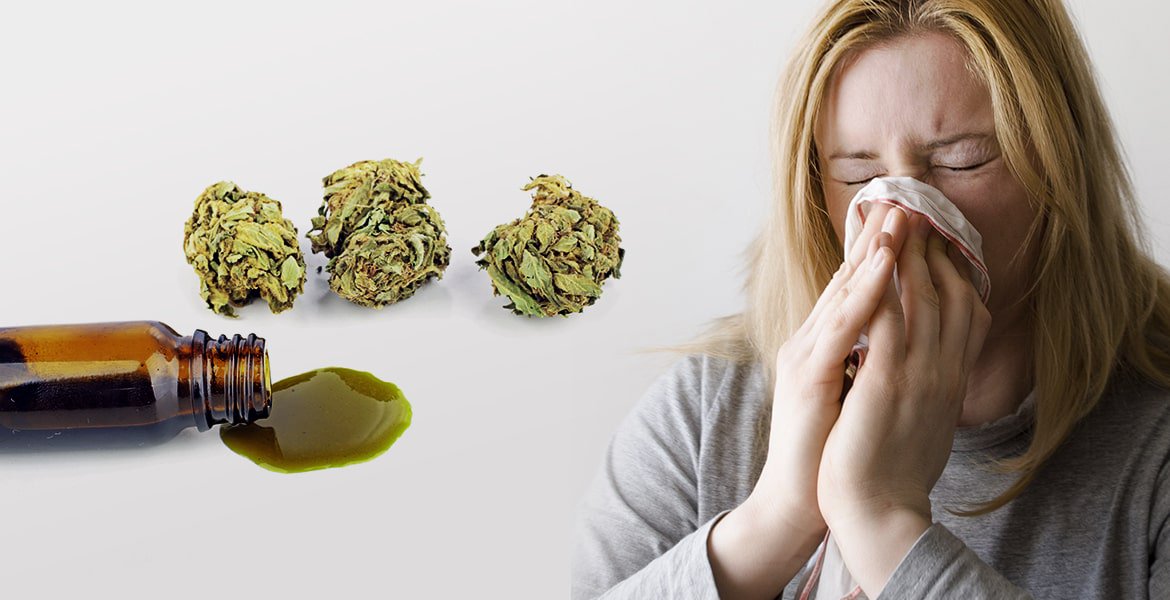
When you buy CBD, what’s your most concerned? That must be safe, right? When we are searching CBD on website, there are so many benefits and disadvantages. However, benefits always more attractive. Today we will talking about CBD allergies and something we need know about allergies symptoms.
Can you be Allergies on CBD?
As in some area hemp extracts including CBD are legal to medical use only, now, you may know the answer is yes. I am not indicating CBD is a medicine with treat effect, but a good thing can better our health. So, you can be allergic to CBD. Eating, touching, or inhaling cannabis plants can trigger allergic reactions as a result of contact with pollen. Inhaling that pollen may lead to hay fever.
A 2018 study found that people with allergies to plants, dust mites, cat dander, and mold, have a higher risk of developing an allergy to cannabis. However, no other study has evidence this subject. More quality research is needed to build a consolidate connection between cannabis and allergic reactions.
Considering the risk of allergies from pollen or mold, you should be particularly careful when choosing CBD products. You can purchase only from companies who use organically grown hemp and test their CBD oils in third-party laboratories for potency and potential contaminants. The latter may trigger an allergy to CBD oil that may not result from CBD itself.
Allergy is complicated that may have different symptoms with different people. So does CBD, its allergies symptoms can manifest in many different ways. So it can be difficult to tell the difference between a CBD allergy and the mild side effects of CBD.
Potential adverse reactions to CBD oil include dry mouth, changes in appetite, dizziness, fatigue, and diarrhea. These aren’t the symptoms of an allergic reaction to CBD. Fortunately, the majority of these effects are nearly nonexistent in regular doses.
Here are a few possible signs of a CBD allergy:
• Skin irritations: when you use a CBD topical, you may notice hives or a rash as the symptoms of your allergy to CBD. However, these reactions may be caused by one of the many ingredients in creams and other skincare products, so make sure to scan the list of ingredients thoroughly.
• Dry, itchy, or red eyes: this symptom is commonly associated with cannabis users — it results from vaping THC — but some people might experience droopy, red eyes after taking CBD oil. If you have this kind of reaction, it might be a sign that you’re allergic to CBD.
• Migraines: While a slight headache might occur after taking a higher dose of CBD, migraines are a severe reaction that can indicate an allergy to some of the ingredients in CBD oil.
• Breathing difficulty: If you experience difficulty breathing, seek immediate help. This is most likely the side effect of poor-quality products that contain mold or hazardous additives.
If you have a history about plant allergies, try CBD isolate instead of full-spectrum or broad-spectrum CBD. The latter is made using the entire plant, meaning they contain cannabinoids, terpenes, flavonoids, essential oils, and plant waxes. Such products carry a higher risk of triggering an allergic reaction.
Also, trying a few different CBD products: full-spectrum, broad-spectrum, and isolate, you may find out which form of CBD works without any adverse reactions. And you’d better check with a doctor for medical advice on what to do when you start experiencing the symptoms.
• Always check the ingredient list: Reviewing a product’s ingredients list should always be the priority before purchasing, as this allows you to make sure there’s nothing in the product that you may be allergic to. If you find a brand that doesn’t list its ingredients on label, this should be considered a warning sign. At Hunan MISO, we always provide complete ingredient lists for every product we sell.
• Take a look at lab sheets: The more information you can read about a product, the better. On certified lab reports, you can typically find a full breakdown of cannabinoid and terpene content. Other tests such as heavy metal, pesticide, and solvent content tests should also be accessible.
• Contact the company directly: If, after checking ingredient lists and the lab reports, you still feel uncertain about using a product, contact the company directly. Speaking one-to-one with a company representative will allow you to explain your concerns about a particular ingredient or product.
• Speak with a medical professional: For anyone worried about potential allergy symptoms, a doctor or physician should always be the first point of contact. They’ll be able to advise you on the safest products for you and your needs.
Although the research into the health benefits of CBD oil for allergies is limited, multiple studies have highlighted its anti-inflammatory and immunosuppressant properties. Inflammation is the underlying cause of allergic reactions.
Researches is limited on the health benefits of CBD oil for allergies. However, there are many studies have shown good results on anti-inflammatory and immune properties, which are the root result of allergic reactions. A 2011 research report published in the journal Free Radical Biology and Medicine analyzed the potential benefits of CBD for different inflammatory disorders. CBD would seem to be a promising starting point for further development given its antioxidant (although relatively modest) and anti-inflammatory actions on immune cells.
Conclusion
If you are not allergy with CBD, congratulations. If you don’t know, don’t worry, and be more careful. Hope things we talking here can help you. If you are a newcomer start with CBD product, you’d better start with lowest dosage according with recommendation, and use with patience. It generally takes 15~30 minutes to notice the difference.